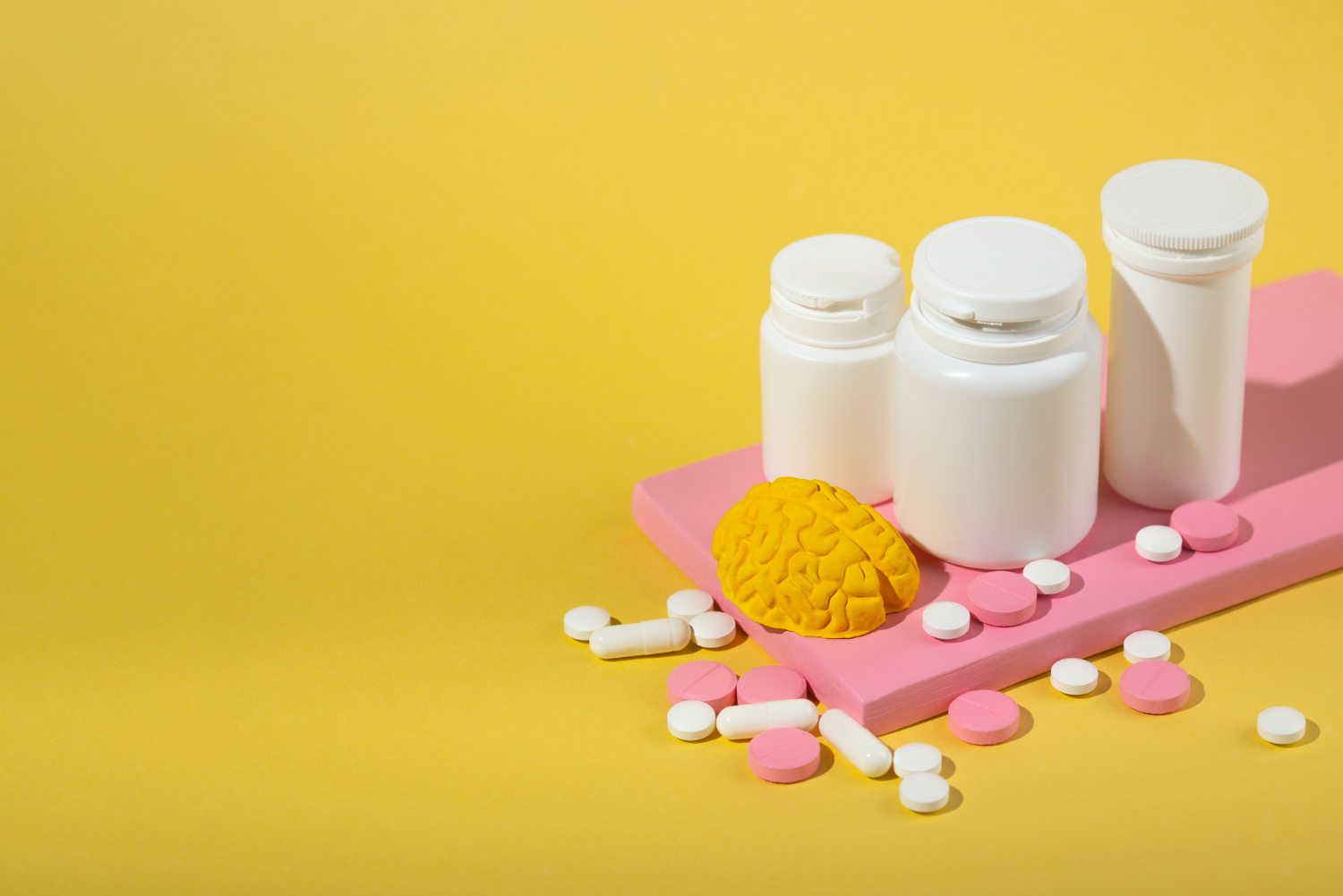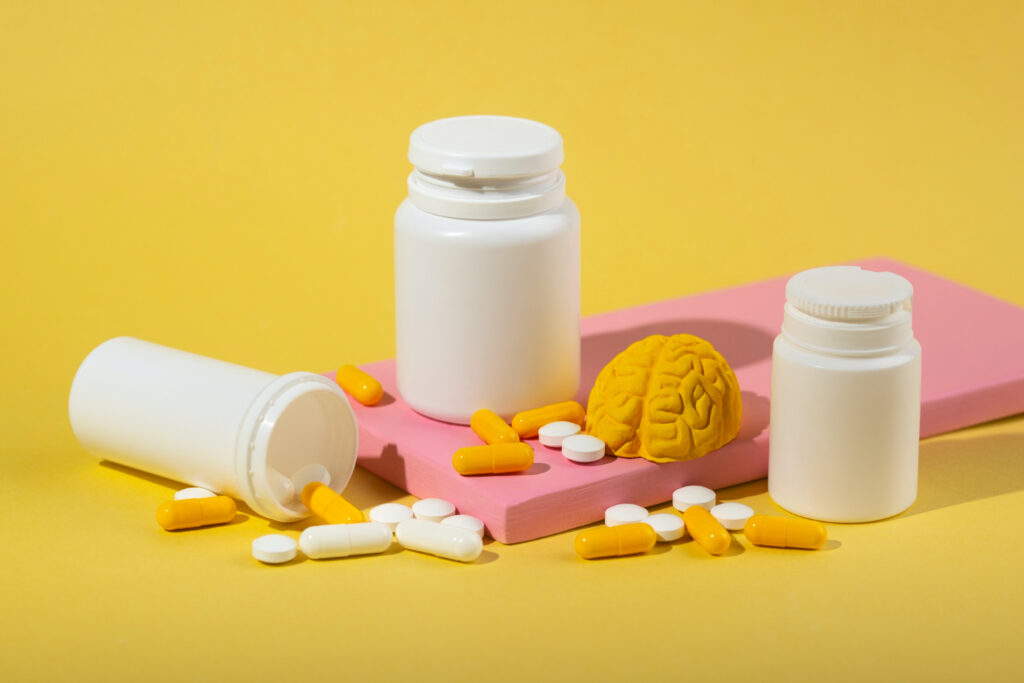
Introduction to Their Mechanism of Action, Types, and Side Effects Depression and anxiety disorders are some of the most prevalent mental health issues in the modern world and affect millions of people across the globe. These issues can seriously deteriorate the quality of life for a person and, if not treated in time, can lead to more serious problems. Along with various psychotherapy methods, medication is one of the most effective ways to control and reduce symptoms of depression and anxiety. There are several types of medications, each of which works to regulate brain chemistry and improve mood. Understanding these medications, and being aware of their effects and side effects, will help people cope better with their disorders and pursue more effective treatment.
Types of Antidepressants
These drugs usually affect the level of serotonin, norepinephrine, and dopamine-those are considered the most significant neurotransmitters associated with mood. The main types of antidepressants include the following:
- Selective Serotonin Reuptake Inhibitors
The most common and widely used antidepressants are called selective serotonin reuptake inhibitors, or SSRIs. Medications in this class of drugs specifically influence the levels of the neurotransmitter serotonin. Serotonin is a neurochemical that helps regulate mood. Because SSRIs prevent the reabsorption of serotonin in the brain, the levels of serotonin in the synapses increase and help improve the symptoms of depression and anxiety. Common names include the following:
- Sertraline (Zoloft)
- Sertraline (Asentra)
- Citalopram (Celexa)
- Fluoxetine (Prozac)
- Escitalopram (Lexapro)
Common side effects of SSRIs, though usually mild and temporary, include the following:
- Nausea and headache
- Insomnia or drowsiness
- Dry mouth and dizziness
- Decreased libido or sexual dysfunction
These medications are often used as the first-line treatment for depression and anxiety because of their high safety profile and very minimal side effects.
- Serotonin-Norepinephrine Reuptake Inhibitors
Serotonin-Norepinephrine Reuptake Inhibitors (SNRIs) – Besides their influence on serotonin, this class of drugs also acts on norepinephrine. Norepinephrine is a significant neurotransmitter that controls stress and reactions through external stimuli. The increase in this chemical enhances energy, concentration, and diminishes symptoms of depression. Common names include:
- Duloxetine (Cymbalta)
- Venlafaxine (Effexor)
SNRIs can present many of the same side effects as SSRIs but might also cause the following:
- Excessive sweating
- Anxiety or restlessness
- Increased blood pressure
These medications are generally reserved for patients who fail to respond to SSRIs.
- Tricyclic Antidepressants
Tricyclic antidepressants were one of the first classes of medications developed to treat depression. These drugs dramatically affect both serotonin and norepinephrine, increasing levels of these neurochemicals in the brain. Common names include:
- Amitriptyline (Elavil)
- Imipramine (Tofranil)
They are usually prescribed when medications have failed because of side effects more serious. TCAs are associated with the following side effects:
- Gain in weight
- High degrees of drowsiness
- Constipation and drying of the mouth
- Heart disorders and low blood pressure
Even though it is still used in current times to treat depression and anxiety, their use is in specific cases or in treatment resistance due to their relatively high adverse effects.
- Monoamine Oxidase Inhibitors
MAOIs were one of the first generations of antidepressants. They work by blocking an enzyme called monoamine oxidase, increasing the levels of serotonin, norepinephrine and dopamine. They have high diet and medication interaction profiles, thus are not prescribed as commonly, and often reserved for patients who do not respond to other medications. Common Names include:
- Phenelzine (Nardil)
- Tranylcypromine (Parnate)
MAOIs require a special diet because of their high interactions with foods and some medications. Consumption of foods containing tyramine in them- aged cheeses such as cheddar and parmesan; fermented and processed meats such as sausage, sausage, salami, and bacon; smoked and pickled fish-smoked fish and herring; fruits that have been preserved like raisins, figs, and dried apricots; fermented sauces such as soy sauce and fish sauce; chocolate, and cocoa may result in a sharp increase in blood pressure and serious complications. Other adverse side effects:
- Weight gain
- Sleeplessness or somnolence
- High blood pressure if taken incorrectly
Though not in wide use today, due to side effects and limitations, MAOIs are very effective in treating treatment-resistant depression.

Types of Antianxiety Medications
These medications can help individuals who suffer from anxiety disorders, panic attacks, or insomnia to feel more relaxed and better cope with everyday anxieties.
- Benzodiazepines
The benzodiazepines are among the most effective and rapid-acting anti-anxiety medications known and widely prescribed for acute anxiety and insomnia. The mechanism of action of such medications is based on enhancement of GABA, an inhibitory neurotransmitter in the brain, thereby dampening CNS activity and generally producing relaxation. Common names include the following:
- Diazepam (Valium)
- Alprazolam (Xanax)
- Lorazepam (Ativan)
The major indications for the use of benzodiazepines are acute, short-term anxiety and when a person has severe insomnia. These medications act very fast and can immediately calm an anxious patient. However, with great efficacy, it is equally important to exercise caution with benzodiazepines due to its risk for dependence and abuse. Common side effects include the following:
- Respiratory depression in overdose
- Decreased balance and coordination
- Physical and psychological dependence
- Drowsiness and decreased concentration
Because of the risk of dependence, benzodiazepines are generally prescribed for short-term use and discontinuation under physician observation is highly recommended.
- Non-benzodiazepine drugs
Among the non-benzodiazepine drugs known to treat anxiety is a drug called buspirone. Because this drug does not carry any risk of dependence, as associated with benzodiazepines, its action does not take effect immediately either. Common names include:
- Buspirone (BuSpar)
Buspirone works in restoring serotonin levels in the brain and has a progressive sedative effect. While somewhat slower to take effect than the benzodiazepines, buspirone carries fewer risks of dependency over the long term and also offers better anxiety control over a longer period. Unlike the benzodiazepines, buspirone usually presents fewer side effects: Common side effects include the following:
- Nausea
- Dizziness
- Headache
This medication is mainly indicated for the treatment of chronic and persistent anxiety and, unlike benzodiazepines, is not indicated in severe insomnia.
Common Side Effects and Their Management
While generally antidepressants and neuroleptics can have positive impacts on a person’s psyche, taken concurrently, with these effects, is also the possibility of their side effects. These may be variant as according to the type of the drug and the person also, but there are many usual side effects among most of the neuroleptics and antidepressants, the intensity of which can be reduced, along with their impact with some proper management.
- Dry mouth
Most antidepressants and neuroleptics have the tendency to cause dry mouth. Some of the complications that may arise from this problem include increased risk of dental caries and oral infections. To manage this condition:
- Ample water intake
- Chewing sugar-free gum
- Mouthwashes for dry mouth
- Weight gain
Other common side effects of certain antidepressants and mood stabilizers include weight gain. The weight gain could be a result of the metabolic changes and increased appetite associated with the medication. To address weight gain:
- Healthy, low-calorie diet
- More physical activity and regular exercise
- Consult your doctor to see if adjustment of medication dosage is possible
- Sexual disorders
A common side effect of some antidepressants is a decrease in libido or impaired sexual function. This problem may occur due to the effects of the medication on neurotransmitters in the brain. To reduce this side effect:
- Consult your doctor to change your medication or adjust your dosage
- Use alternative medications that have fewer effects on sexual function.
- Nausea and digestive problems
Neuroleptics and antidepressants can cause nausea and problems in digestion, especially in the first weeks of treatment. These usually diminish when the body gets accustomed to the medication. Strategies to deal with these side effects include:
- Use antiemetics if needed
- Take medication with food
Importance of doctor consultation
Neuroleptics and antidepressants, while effective for the control and improvement of mental symptoms, call for very cautious prescription and follow-up. Each subject has to be treated with a particular type and dosage of medication; this need may also change with time.
- The role of the doctor in determining the type of medication and dosage that is suitable
Antidepressants and anti-anxiety medications, of course, should be done under the doctor’s supervision. The reason is simple: the sensitivity and complications involved in adjusting the dosage, monitoring the possible body reactions to such medications that are different in each patient; thus, the physician needs to monitor the patient’s condition in several stages of the treatment and change the dosage amount if necessary.
- Dose adjustment
It typically starts off with small doses and progresses depending on the condition and response of the patient. This reduces the chances of side effects at the beginning of the treatment.
- Side effect management
The doctor can review common side effects of medications and suggest ways to reduce them. Also, if the patient has severe reactions to a particular medication, the doctor can replace it with another medication.
- Drug interactions
Some antidepressants and anti-anxiety medications can interact with other medications and even with food, potentially causing serious side effects. It is, therefore essential that the patient is informed about possible drug interactions and will need to let the doctor know about what medications he is presently taking, which also covers herbal remedies, supplements, and over-the-counter medications.
- The need for monitoring and adjusting medication over time
With time, the condition of the patient and the response of his body may change. In this regard, regular follow-ups with the doctor will be required to revise the medication. This may involve the following:
- adding another medicine to the treatment;
- increasing or decreasing the dose of medication;
- replacement of the medicine in cases of side effects.
- Important warnings about abrupt discontinuation of medication
One of the most important points in taking neuroleptics and antidepressants is their abrupt discontinuation. Most of these drugs establish physiological dependence, and sudden withdrawal may lead to symptoms including:
- Flu-like symptoms
- Dizziness and severe headache
- Increased anxiety and depression
Among others, this calls for gradual withdrawal of all medicines under a doctor’s supervision to avoid withdrawal symptoms.
- How long it takes for medications to work
Unlike most medications, antidepressants and anti-anxiety medications take some time to be effective. They do not act rapidly within the body, and the patient needs to be informed about this to prevent sudden stoppage of the medication.
- Antidepressants
These drugs take around 2-6 weeks to fully kick in. During this time, the patient may be experiencing initial side effects which gradually subside. The doctor may advise the patient to continue for that time and not pay much attention to the initial effects as positive effects will come with time.
- Antianxiety medications
In some cases, Benzodiazepines have quite immediate effects and prove highly potent to reduce anxiety suddenly. Due to the danger of its addiction, however, benzodiazepine could not be a medication which was prescribed long. According to the characteristics, meanwhile, antianxiety medicines are those acting slow- namely SSRI medicines -the improvement may appear several weeks after medication.
Final Thoughts
Antidepressants and anxiety medications help upgrade their quality of life or a person with mental illness. This requires knowledge about the type of medication involved and its potential side effects and ongoing follow-up consultation with the doctor. Pharmacological intervention proves most successful when supplemented with psychotherapeutic counseling together with great caution during follow-ups. Patients should be compliant with their medications, yet at the same time not become so non-compliant as to forgo the need for regular physician follow-up, such that they can have a gradual improvement and be kept away from potential drug side effects. Treatment is only successful when it is collaborative between the patient and the doctor.
References
Anxiety and Depression: Optimizing Treatments
Pharmacotherapy for Depression and Anxiety in the Primary Care Setting








No comment yet, add your voice below!